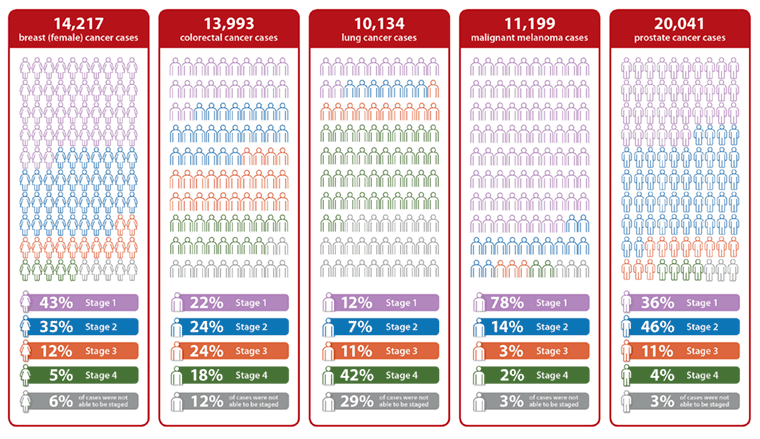News
New ‘stage of diagnosis’ data from Cancer Australia offers valuable insights for GPs
New data released by Cancer Australia on stage of diagnosis for the nation’s five most prevalent cancers highlights challenges and strategies for management in general practice.
 Cancer Australia CEO Dr Helen Zorbas believes the new data is an important step forward in the ‘knowledge to inform cancer control’.
Cancer Australia CEO Dr Helen Zorbas believes the new data is an important step forward in the ‘knowledge to inform cancer control’.
Nationwide data has been released for the first time in Australia about the stage of diagnosis for the country’s top five incidence cancers – female breast cancer, colorectal, lung, prostate and melanoma.
This project, a Cancer Australia-led collaboration between all state and territory cancer registers and the Australian Institute of Health and Welfare (AIHW), places Australia among world leaders in population-level cancer data on this topic.
‘We are among the first countries worldwide to be doing this. It’s a really significant step forward in terms of our information and knowledge to inform cancer control, and I think we’ll provide great insights going forward,’ Dr Helen Zorbas, Chief Executive Officer of Cancer Australia, told newsGP.
 Stage of diagnosis for the top five incidence cancers in Australia. (Image supplied by Cancer Australia and reproduced with its permission)
Stage of diagnosis for the top five incidence cancers in Australia. (Image supplied by Cancer Australia and reproduced with its permission)
The data reveals some strong variation in stage of diagnosis – that is, the extent to which a cancer has spread before being diagnosed – between the five most common cancers. Around 77% of cases of breast cancer in women, 82% of prostate cancer in men and 92% of melanoma cases are diagnosed at an early stage. By contrast, the rate of early diagnosis for colorectal cancer is around 46%, while lung cancer is close to 18%.
According to Associate Professor Joel Rhee, GP and Chair of the RACGP Cancer and Palliative Care Specific Interests network, the data offers some support for initiatives such as the National Bowel Cancer Screening Program.
‘People who were aged over 50 appeared to be diagnosed with an earlier stage of colorectal cancer compared to people who were diagnosed at a younger age,’ Associate Professor Rhee told newsGP. ‘This seems counter-intuitive, because you would probably expect younger people experiencing symptoms to go to the doctor earlier and get it diagnosed.
‘But over 50-year-olds in Australia have the National Bowel Cancer Screening Program, and the latest evidence is that just under 40% of over 50-year-olds are getting screened for bowel cancer. That’s probably leading to the discrepancy [in early diagnosis] between people who are over 50 versus people under 50.’
Although the data is presented at population level and not intended to inform individual patient care, Associate Professor Rhee believes it can also highlight the challenges faced by GPs in terms of diagnosing cancer in younger patients.
‘As people get older, the chances of getting cancer increase quite drastically,’ Associate Professor Rhee said. ‘In older patients, concerning symptoms are much more likely to signify something serious, whereas the same symptoms in younger patients are more likely to be benign.
‘But, obviously, the problem is that something like bowel cancer can affect people in their 20s or even their teens; although rare, it happens. And unless you have a way to pick up these patients, you’re going to miss some of these diagnoses. That’s a real challenge for GPs.’
However, Associate Professor Rhee believes Cancer Australia’s data also underlines for GPs the essential role of preventive care, although this can be a difficult effort for GPs to maintain.
‘As GPs, who have been at the coalface for years, going on at our patients about stopping smoking and doing the right lifestyle things, we sometimes lose a bit of faith because it’s really hard to get people to change their behaviour,’ Associate Professor Rhee said. ‘But data like this makes you realise it’s really important to just go back to basics.
‘So the big take-home message is, things can be improved and one of the really important ways that GPs can contribute is by getting people to adopt healthier lifestyles, stopping smoking and moderating their alcohol consumption.’
Dr Zorbas hopes that the data on stage of diagnosis will continue as an ongoing collection and reporting initiative. She is also looking ahead to how the data can be used to achieve in terms of guiding future research and cancer control strategies.
‘The real added value will be the next part of work, which will involve the linkage of this stage of diagnosis data with the survival data, so we can look at how stage impacts on survival overall, and ultimately how treatments are also impacting on survival at different stage of disease across those five different cancer types,’ she said.
Visit the National Cancer Control Indicators website to access the data on cancer incidence at stage of diagnosis for Australia’s top five incidence cancers. Information can be filtered by tumour type and patient category, such as sex, age, Aboriginal and Torres Strait Islander status, remoteness of residence and socio-economic status.
Cancer-Australia Cancer-data cancer-screening cancer-stage-of-diagnosis
newsGP weekly poll
Do you think GLP-1 RA medicines should be added to the PBS as a treatment for obesity?